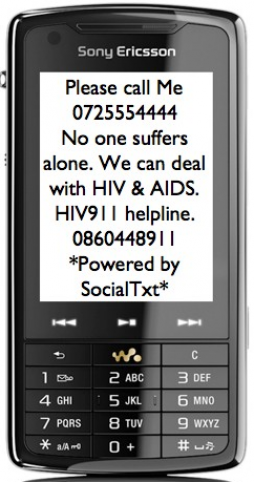"Please Call Me" messages are a popular cultural form of mobile communication in South African society. These USSD messages are used to advertise everything from car insurance to domestic airlines to the local corner store. Today, thanks to a recent project by SocialTxt, these free messages are used for the first time ever for social marketing: to encourage South Africans to get tested for HIV and obtain AIDS information.
"Please Call Me" (or PCM) messages evolved from the practice of "beeping," or calling someone and hanging up after a ring or two. Beeps, also known as missed calls or flashes, are a signal for the recipient to call someone back when the caller is low on airtime. Carriers started providing PCM messages free of charge after they found that the networks were getting inundated by millions of beeps a day. Studies estimate that between 20 and 30 percent of calls made each day in Africa are beeps. "It is widespread," said Informa analyst Devine Kofiloto in this Reuters article. "It is a concern for operators in African countries whose networks become congested depending on the time of day with calls they cannot bill for." Beeping is so prevalent in Africa that a whole culture has developed around the practice, notes Jonathan Donner in his paper "The Rules of Beeping: Exchanging Messages Via Intentional "Missed Calls" on Mobile Phones .
Robin Miller and Gustav Praekelt, partners at the Praekelt Foundation, had a conversation this week with MobileActive about using PCM messages for social marketing. The Foundation recently completed a pilot of SocialTxt, their mobile social marketing service for NGOs. Both Robin and Gustav said that PCM messages offer a powerful new space perfect for marketing and advertising.
Each PCM message has the words "Please Call Me," the phone number of the caller, and an advertising space of about 115 characters. Robin said that to the best of their knowledge SocialTxt is the first non-commercial use of this advertising space.
SocialTxt's six-week pilot project involved partnering with two AIDS initiatives -- HIV911 and South Africa's National AIDS Helpline -- and a campaign for People Opposing Women's Abuse (POWA). The AIDS Helpline, which is funded by the National Department of Health and managed by LifeLine Southern Africa, provides free counseling and referral services for people with HIV/AIDS. Lifeline was receiving about 45,000 calls per month at the start of the trial. When the SocialTxt ads were active, LifeLine experienced a 136% increase in call volume, or about 1500 additional calls per day. "We were amazed at the increase in such a short period of time," said Robin.
A similar partnership with HIV911, which provides a database of HIV-related service providers, was equally successful. About 98% of all calls received by the hotline were referrals from SocialTxt. A follow-up survey showed that 41% of these callers accessed HIV services.
SocialTxt estimates that during the pilot 23,000 calls were made in response to the PCM messages, which resulted in at least 9,000 individuals taking advantage of HIV services. A sample ad reads, "AIDS Helpline 0800012322 Information, Emotional Support, and Counseling 24hrs*Powered by SocialTxt*"
The POWA campaign used similar ads to recruit "change agents" to respond to and report domestic abuse in their communities. The pilot was part of POWA's "I Commit" campaign around the time of South Africa's Women's Day. Over the five day pilot, 1,061 people texted the words "I Commit" to a short code. POWA will follow up throughout the year with these "change agents" and send them messages about ending violence against women. The PCM ad space for the six week pilot was donated by Vodacom.
PCM messages are overwhelmingly popular in South Africa. Within the Vodacom network alone, between 18 and 20 million PCM messages are sent each day, an astounding number for a nation of 44 million people. Currently, about 83% of the South African population has a mobile phone. Robin said that PCM messages are a particularly powerful advertising method because they are so personal. "It's [the information for an HIV clinic] personalized and stored on a phone. You can dial when and where you have a question," said Robin.
Gustav said that another advantage of PCM advertising is that it provides social marketers with quantitative results. Unlike television or radio advertising, where it's difficult to know exactly how many people saw an ad and how many responded because of that ad, PSM advertising provides a direct and measurable link between the user and end goal. "You can measure exactly how many people saw the messages, how many people called, and how many people used the service," said Gustav. SocialTxt tracked usage of HIV services through follow up calls with people who had called the hotline.
The Praekelt Foundation, which Gustav calls a "technology incubator for developing mobile products for NGOs," is the non-profit side of Praekelt Consulting. The Foundation is still young -- it started at the beginning of this year -- but Gustav has plans for the future that involve a management website where NGOs can track mobile marketing campaigns and a free HIV/AIDS information mobile television channel. Robin said that while SocialTxt has considered advertising on web-enabled mobile phones, the populations that most NGOs are targeting are more likely to be those that use PCM messages. "South Africans with WAP-enabled phones typically reside in a higher socio-economic bracket. In terms of social marketing, my objective is to reach the largest number of people the fastest," she said. For now, SocialTxt will stick with the PCM ads. "I think the value of the pilot that we ran really indicates that there's a need and there's a gap that we're filling," said Robin. "Over 23,000 callers indicates that the volumes that the call centers are receiving aren't nearly enough, and we have the power to change that."


Post new comment